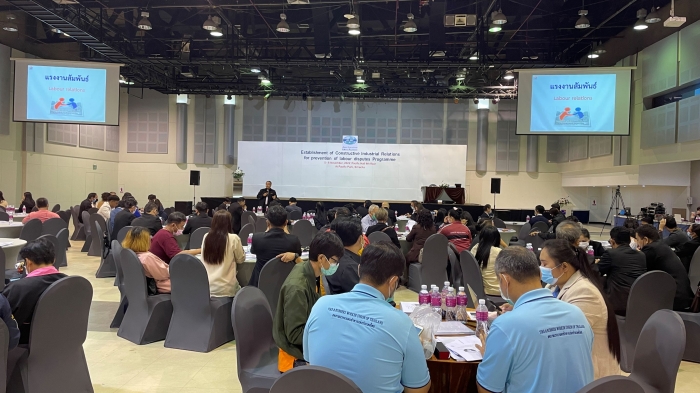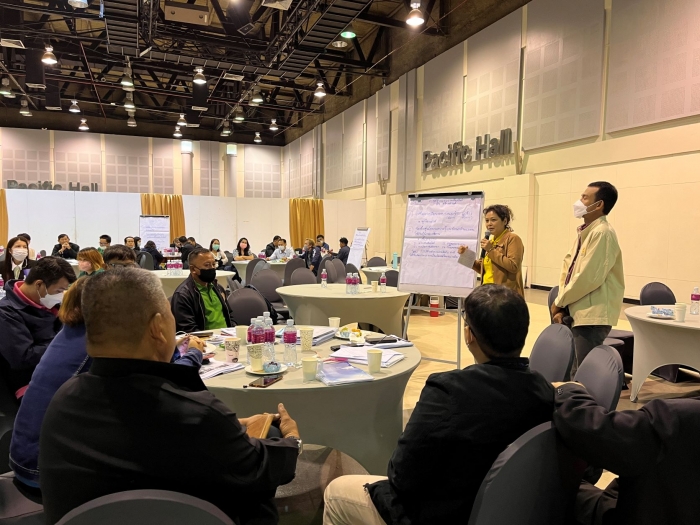ITUC-TC/JILAF Seminar on Industrial Relations (IR) and Labour Policy in Thailand
From November 5-6, the Japan International Labour Foundation (JILAF), together with the Thai Council of the International Trade Union Confederation (ITUC-TC), held a seminar on industrial relations and labour policy in Si Racha, Thailand. The seminar was attended by a total of 137 people, including the leaders of each member organisation.
At the beginning of the seminar, JILAF Executive Director Motobayashi made opening remarks by thanking the participants, then explaining the significance of being able to hold a face-to-face seminar once again after three years, and expressing his hope for the success of the seminar, in which there were going to be discussions about establishing constructive industrial relations post-COVID-19. Following this, Representative Nylanut of the ITUC-TC, Special Expert Dusit of the Thai Ministry of Labour, and Secretary-General Siriwan of the Employers’ Confederation of Thailand (ECOT) each gave their own opening remarks confirming the importance of constructive industrial relations.
During the seminar, JILAF Counselor Kogure gave a lecture on business and human rights, and the recent labour situation in Japan, and explained matters such as the trends in business and human rights, developments in due diligence legislation in various countries, and initiatives in an aging society with a declining birthrate.
Next, Special Expert Dusit of the Thai Ministry of Labour acknowledged the differences in the positions of labour and management, then gave a presentation on how to prevent industrial disputes, how to build constructive industrial relations, solutions for industrial disputes, and the response of the Ministry of Labour.
Afterwards, Mr. Jono and Ms. Otsuji of the ILO gave presentations on constructive industrial relations, and business and human rights post-COVID-19. They also talked about the importance of social dialogue for resolving issues between labour and management, and revising labour laws in Japan, and suggested that conflicts and cooperation between trade unions and employers, and balance between rights and obligations, are important, and that trade unions could provide a new approach to labour movements by understanding business and human rights.
In addition, a local trade union shared a past example where industrial relations were improved, stating, “Despite going on strike for twenty seven days, both the company and trade union suffered losses. But after that, labour and management began to have sincere discussions, and established constructive industrial relations.”
On the second day, JILAF Executive Director Motobayashi gave a lecture on the roles and challenges of labour movements in Japan. He also shared that industrial relations in Japan have changed in accordance with the economy and society, and that although there used to be combative industrial relations in the past, there are now constructive industrial relations that were built over a long time.
Following this, Secretary-General Siriwan gave a presentation on constructive industrial relations post COVID-19. He stated that constructive industrial relations cannot be built without the understanding and cooperation of both labour and management. In addition, he made a proposal to the participants at the venue to have labour and management consider establishing a system for spreading and promoting constructive industrial relations, to which the participants agreed.
Afterwards, a group discussion was held on the topic of “Preventing Industrial Disputes by Building Constructive Industrial Relations Post COVID-19.” This was followed by presentations from each group about matters such as the following:
〇 In the future, necessary vocational training and human resource development and training will be promoted jointly by labour and management.
〇 Sustainable and constructive industrial relations will be built through dialogue (labour-management consultations, etc.).
〇 Having labour and management jointly implement CSR activities will build points of contact and a relationship of trust between labour and management, which will in turn create constructive industrial relations.
At the end, Executive Director Motobayashi closed the seminar by thanking the participants for their active participation, then sharing his prediction that business and human rights will become important topics for both labour and management in the future.



